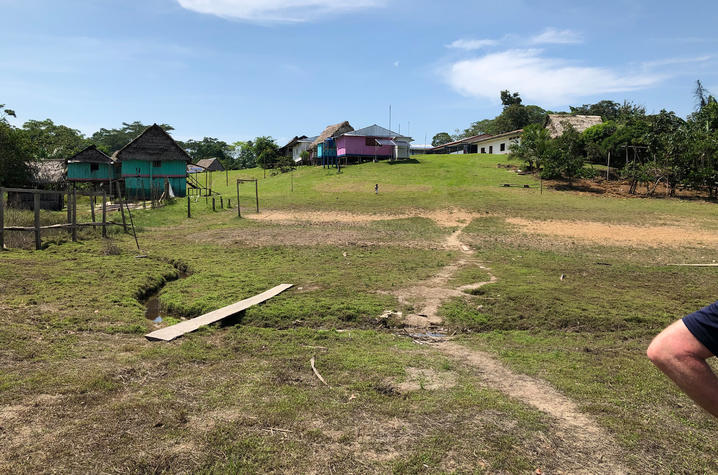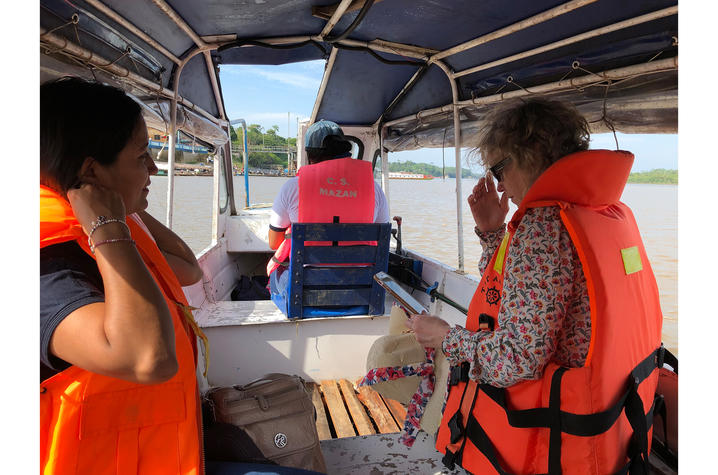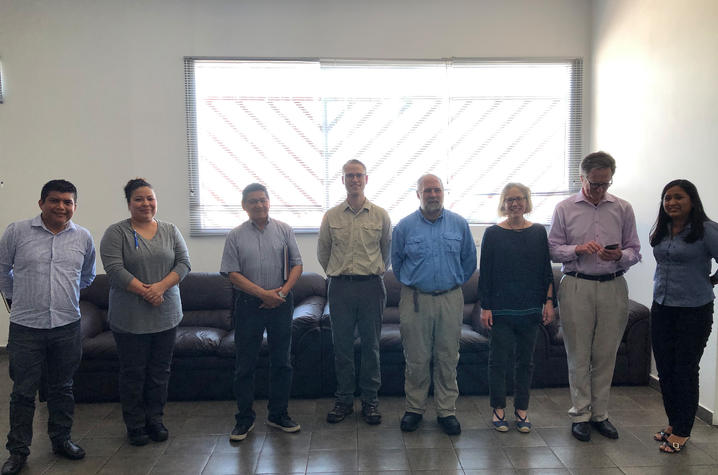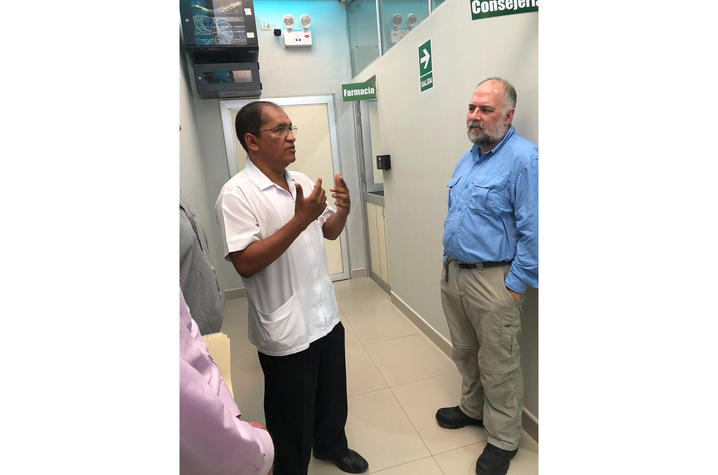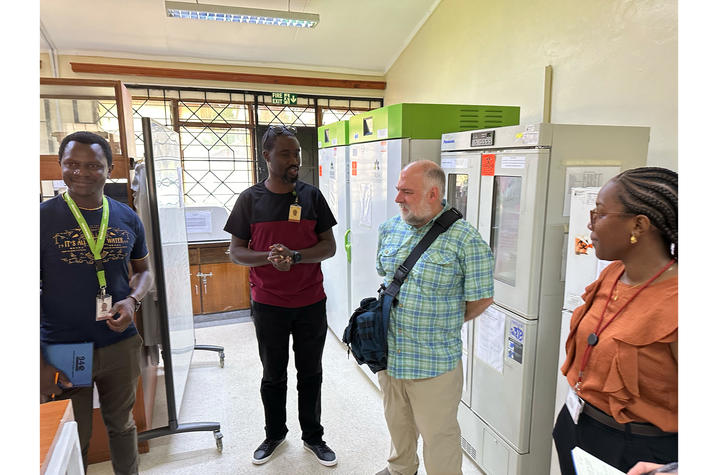UK Pharmacy dean continuing work with promising anti-malarial drug
LEXINGTON, Ky. (April 23, 2024) — It is a project that Kip Guy, dean of the University of Kentucky’s College of Pharmacy, has been working on for nearly two decades now. The work centers around something most people have heard of but even though it is widely known, it is not something that gets a lot of attention in the United States.
Malaria is a life-threatening disease spread between humans by some types of mosquitoes. It is mostly found in tropical countries. It is preventable and curable. According to the World Health Organization (WHO), there were an estimated 249 million cases of malaria and 608,000 malaria deaths across 85 different countries. The African region held 94% of these malaria cases and 95% of the deaths. Children under the age of five accounted for about 80% of the malaria-related deaths in Africa in 2022.
That statistic points directly to the first reason malaria has been a focus for Dean Guy all these years. “The mortality is almost all small children. And the way adults wind up not dying from malaria is by surviving being repeatedly infected. So, most kids in Africa, by the time they are five, they have had 10 to 15 cases and then they have a durable immunity,” explained Guy.
Additionally, there’s a great interest for him from a biological and pharmacological standpoint. “I split my research time between cancer and parasitic diseases. Malaria is a unicellular eukaryotic organism that hides in one of your tissues. So, at a lot of levels, it is actually like a cancer. It immune evades, it is trophic for a particular tissue, it goes through the same kind of cell cycle,” said Guy. “There are even direct overlaps with some of the targets we use to treat malaria are the same ones we use in oncology.”
Specifically, the drug Guy and his collaborators have been developing works in a way similar to cancer immunotherapy. “It essentially causes the infected red blood cell to become visible to the host immune system. Then your body clears out those red blood cells, which is largely immunologically driven.”
The third thing drawing him to this area of work is that it is almost exclusively a disease of access prevention due to economic issues. “The further I got into my career, the more I became motivated by access and patient inability to access treatments,” said Guy. “A lot of the people in Africa who need care, literally cannot get it.”
Guy started this particular research during his tenure as a professor at the University of California San Francisco.
“At that point, it was technology-oriented,” he said. “We partnered with Joe DeRisi, who now runs the Chan Zuckerberg Institute, and developed a way to search for compounds that acted on the parasite in a host cell without worrying about mechanisms.”
Several years later, Guy was recruited to St. Jude Children’s Research Hospital to serve as the chair of the St. Jude Department of Chemical Biology and Therapeutics. He continued to develop this methodology and was able to adapt a robotic system that let his team test millions of potential compounds.
The years of collaborative work eventually led to a team of researchers organized by Guy, including those at the University of Kentucky, St. Jude Children’s Research Hospital in Tennessee, Eisai in both the United States and Japan, Medicines for Malaria Venture (MMV) in Switzerland and QIMR in Australia, discovering a new, fast-acting anti-malarial compound that has shown promise in fighting malaria. The compound, SJ733, became one of the first in a new class of anti-malarial compounds to reach clinical trials.
Guy is thrilled that their work with this compound will likely continue thanks in large part to a recently announced investment by the Global Health Innovative Technology Fund of approximately $5.4 million in the anti-malarial drug project between Eisai Co., Ltd. and the University of Kentucky. Work with this fund is unique as every project requires partnering with a Japanese pharma company. “Japan has a lot of great scientists who are really innovative and really good at delivering. They’ve been so insular in the past, that GHIT being willing to find these collaborative projects has started roughly 20 collaborations that wouldn’t have otherwise ever existed,” said Guy.
The Phase 2b trial will follow their Phase 2a trial which took place in Peru and was able to close early due to researchers meeting all the needed criteria about two-thirds of the way through.
Guy calls the Phase 2 studies of the drug its first real-world test. “You can do things in controlled trials in first-world settings, but until you really get out into the field you do not really know what is or isn’t going to work,” said Guy.
Phase 1 was split into two studies – a total of 38 healthy volunteers were recruited as part of the Phase 1a study in Memphis, led by Aditya Gaur of St. Jude, and Phase 1b study in Brisbane, Australia, led by James McCarthy at QIMR.
Twenty-three of the volunteers in Memphis received increasing doses of SJ733. The testing helps researchers to understand the dosing, safety profile and metabolism, including absorption.
Based on those results, 15 Australian volunteers underwent modified testing. These volunteers received SJ733 after being infected with malaria in the clinic. This allowed researchers to understand the anti-malarial effectiveness of the new drug by looking at the level of parasites in their blood and treating accordingly. The participants also received a curative dose of conventional anti-malarial combination therapy.
For the anticipated Phase 2b study, Guy’s team will be going to the same location in Peru as the Phase 2a study took place. There, the team of researchers works with Clinica Selva Amazonica, under the leadership of Alejandro Llanos-Cuentas. Patients in the clinic often present with both types of major malaria — something that helps to test the drug against both strains.
“We have good working relationships there and a relationship with the Ministry of Health, so we are all set up and begin the trial to patients once we get all the funding needed and regulatory submissions finalized,” said Guy.
The Phase 2b study is specifically targeting relapsing Malaria. “If you do not cure it when you get the first infection, it has a form that goes to your liver and then it can come back again and again and again,” said Guy.
Guy describes Malaria as an orphan disease in the United States with about 1,500 cases a year, and most are acquired while abroad. “Travelers bring it back. Most years we will get under 100 direct transmissions usually between family members of a traveler.”
The ultimate goal with this new investment is to shorten the treatment period by using SJ733 in combination with the existing drug tafenoquine.
The fact this drug is targeting and intended for underserved populations, Guy says there is a bit of a challenge in getting funding since there is not much money to be made for these drugs. “There is not just a model to follow for this so to speak. All the drugs that have gone forward have been from big companies or governmental entities. We are sort of opening new ground trying to do this,” said Guy.
As the state’s flagship, land-grant institution, the University of Kentucky exists to advance the Commonwealth. We do that by preparing the next generation of leaders — placing students at the heart of everything we do — and transforming the lives of Kentuckians through education, research and creative work, service and health care. We pride ourselves on being a catalyst for breakthroughs and a force for healing, a place where ingenuity unfolds. It's all made possible by our people — visionaries, disruptors and pioneers — who make up 200 academic programs, a $476.5 million research and development enterprise and a world-class medical center, all on one campus.





